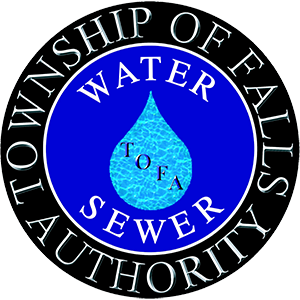WHEN YOU SAVE WATER, YOU SAVE MONEY! AND THE ENVIRONMENT!
Here are some simple ways to conserve water around your home.
INSIDE YOUR HOME
Be attentive for leaks.
A dripping faucet can waste between 8-15 gallons per day! And a leaking toilet can waste HUNDREDS of gallons per day or 73,000 gallons per year! If either is leaking, fix it immediately.
TOFA TIP: While some leaks are obvious, others can be very hard to detect. To test for a leak, look at your meter while no water is running in the house. The meter number should not move. If it does, you most likely have a leaking faucet or toilet in the house.
Reduce toilet usage.
In a home with older toilets, an average flush uses about 3.6 gallons of water (which equals a daily use of 18.8 gallons) per person per day.
TOFA TIP: Place a glass jar of water in your toilet tank. By placing the bottle in the toilet tank, less water is needed to fill the tank and therefore less water is being flushed. You can save up to 10 gallons a day!
Also, when appropriate, check to see if any family members need to use the toilet prior to flushing.
Take shorter showers … or only partially fill your tub.
A daily 10-minute shower will use, on average, 5-8 gallons per minute. That’s 18,250-29,200 gallons per year! And an average tub fully filled for a bath holds 70 gallons of water. That’s 25,550 gallons a year if done daily. Either way, it uses a lot of water.
TOFA TIP: Change your shower head and faucet fittings to low flow or conservation fittings.
Don’t leave the water running while brushing your teeth, shaving or washing dishes.
On average, brushing your teeth with the water running wastes 4 gallons while shaving can waste more than twice that amount.
TOFA TIP: Use a full sink of water to wash the dishes, doing all or most prior to rinsing. Only run the water to rinse your dishes.
Make sure your washing machine or dishwasher is fully loaded.
Newer washing machines and dishwaters use much less water than they used to. But still be efficient when you use either. Only do laundry when you have a full load. And, likewise, only run your dishwasher once it is full.
TOFA TIP: Rinsing off your dishes before loading them into the dishwasher unnecessarily uses more water and really isn’t practical. Simply scrape off any food that’s on your dishes; your dishwasher will do the rest.
OUTSIDE THE HOME:
Go green!
Conserving water outdoors can save you money and help the environment, too, specifically the plants surrounding your home! For instance, rainwater can be collected and then used to water your lawn and landscaping. Look online how to easily create a system that incorporates a closed vessel to prevent mosquito breeding and has a method that allows for easy access to a hose.
TOFA TIP: Plant vegetation that doesn’t require constant watering. Or better yet, reduce the size of your lawn through creative landscaping.
Water your lawn only when it needs it!
Avoid set watering schedules. Under average conditions, your lawn and plants don’t need to be watered every day.
TOFA TIP: To test if your lawn needs water, step on the grass. If it springs back up, there is no need to water it.
Water your lawn early in the day.
The later you water in the day, the more water you’ll lose to evaporation before it can be absorbed by your lawn.
TOFA TIP: Never water too close to dusk. Doing so encourages the growth of fungus, mushrooms, etc., which can damage your plants and vegetation.
Consider your pools, Jacuzzis and hot tubs.
These items require a lot of water. By cutting down on the amount of lost or wasted water, you won’t have to add more and add more to your water bill.
TOFA TIP: When not in use, cover your pool, Jacuzzi or spa to reduce evaporation and limit the over-flows by maintaining lower water levels.
Also, reuse the water from wading pools (and regular pools, Jacuzzis and spas if they need to be drained for any reason) to water your lawn and landscaping. Should you use your swimming pool or spa water, however, make sure that you negate any remaining chlorine residual prior to using it for irrigation.
WANT TO LEARN MORE ABOUT GOING GREEN AND HELPING THE ENVIRONMENT?
To assist our customers in their efforts to become more environmentally aware, TOFA has provided links to the following environmentally friendly websites that offer ideas and products to help conserve water, as well as develop other “green” habits.
The websites that are listed below are for informational purposes only and do not represent TOFA nor are affiliated with TOFA in any way. Further, unless explicitly noted, TOFA does not endorse, warrant, guarantee, authorize or in any other way adopt or take responsibility for the content found on these sites.
 Township of Falls Authority
Township of Falls Authority